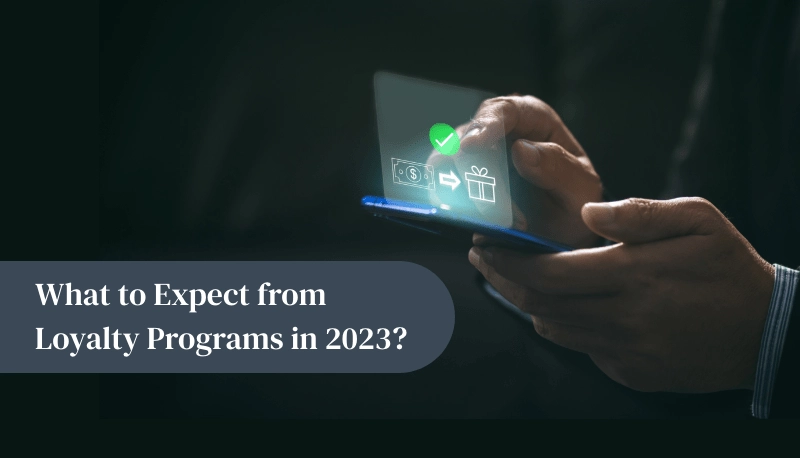In the ever-evolving landscape of business, customer loyalty has become a paramount goal for companies looking to thrive in the competitive market. One of the key strategies that businesses employ to foster customer loyalty is the use of customer loyalty programs. These programs have come a long way since their inception and continue to evolve in response to changing consumer behaviors and technological advancements. In this blog, we will take a deep dive into the evolution of customer loyalty programs, focusing on the trends and innovations that emerged in 2022 and what lies ahead in the world of customer loyalty for the foreseeable future.
72% of customers recommend brands having good loyalty programs. In addition, brands with futuristic vision have hopped on the mantra of holistic loyalty to unlock long-term benefits. Below are the trends that became a mainstream strategy in the loyalty software market in 2022:
Customer Loyalty Trends that Defined the Industry

1. Hyper-personalisation of loyalty programs
Hyper-personalization of loyalty programs represents the cutting-edge evolution of customer engagement strategies, where businesses harness data analytics and advanced technology to tailor rewards and incentives with unprecedented precision. By delving deep into individual preferences, behaviors, and purchasing patterns, these programs create uniquely tailored experiences that resonate with each customer on a personal level. This level of customization not only fosters stronger emotional connections but also enhances customer retention and loyalty, as individuals feel genuinely valued and understood by the brand, ultimately driving sustained growth and profitability.
In a survey, personalization was ranked as the top factor for boosting customer engagement for the next 5 years. As a result, 2022 saw a significant increase in brands adopting a data-driven approach to design loyalty programs.
Radisson Hotel Group revamped its loyalty program with unique perks and high customizability of choosing rewards. Here are more features of the loyalty program:
- Members can redeem 325 points to make their hotel stay carbon-neutral.
- Discount booster allows customers to boost their discounts for future purchases.
2. Rise of Digitalization
The rise of digitalization is a transformative trend that has significantly impacted various aspects of business, including customer loyalty programs. In 2022 and beyond, digitalization has played a pivotal role in shaping the evolution of these programs. Traditional punch cards and physical loyalty cards made way for digital loyalty programs accessible through mobile apps and websites. The convenience and accessibility of digital platforms have allowed companies to gather more data about their customers’ preferences, enabling them to tailor rewards and offers more effectively.
Here’s a more detailed look at how digitalization has influenced customer loyalty.
- Real-Time Engagement: Digital loyalty programs allow for real-time engagement with customers. Companies can send personalized offers, updates, and notifications directly to customers’ devices, increasing the chances of them taking immediate action and making a purchase.
- Omnichannel Integration: Digitalization has facilitated the integration of loyalty programs across various channels, both online and offline. Customers can earn and redeem rewards not only through e-commerce websites but also in physical stores, creating a seamless shopping experience.
- Mobile Apps and Online Platforms: The widespread use of smartphones and the availability of high-speed internet have led to the proliferation of mobile apps and online platforms for loyalty programs. Customers can now easily access their loyalty accounts, check rewards, and redeem points from the convenience of their smartphones or computers.
3. Brands Utilize Gamification to Engage Customers
Brands have increasingly turned to gamification as a powerful tool to captivate and engage their customers in today’s highly competitive market. By integrating elements of gameplay into their marketing strategies, companies create immersive and interactive experiences that foster customer loyalty and drive brand engagement.
Gamification in loyalty programs often takes the form of loyalty programs, where customers earn points, badges, or rewards for their interactions with a brand, such as making purchases, referring friends, or participating in challenges. These rewards provide a sense of achievement and instant gratification, enticing customers to continue their engagement.
Additionally, brands leverage gamified experiences on their websites, mobile apps, and social media platforms to make the customer journey more enjoyable and memorable. By tapping into the natural human desire for competition, achievement, and recognition, brands successfully cultivate deeper connections with their audience, ultimately leading to increased brand affinity and customer retention. Gamification is a proven way to drive customer engagement, with gaming audiences increasing rapidly. Additionally, 81% of loyalty program members like to engage with loyalty programs having a gamified experience.
Fitness Rewards by Strava has taken gamification to the next level. Creating a leaderboard of participants and curating experiential rewards for members who complete challenges makes the loyalty program compelling.
4. Integration of Blockchain and Cryptocurrency
The integration of blockchain and cryptocurrency into customer loyalty programs in 2022 and beyond represents a significant shift in how businesses approach customer engagement and rewards. Here’s a deeper look at how this integration works and the advantages it offers:
1. Tokenization of Rewards:
In loyalty programs that integrate blockchain and cryptocurrency, traditional loyalty points or rewards are tokenized. This means they are converted into digital tokens that exist on a blockchain. These tokens can represent a specific value or benefit, and they are stored securely in a user’s digital wallet.
2. Enhanced Security:
Blockchain technology is known for its robust security features. When loyalty rewards are tokenized on a blockchain, it adds an extra layer of security. Cryptographic techniques are used to ensure the authenticity and integrity of each transaction, reducing the risk of fraud and unauthorized access.
3. Global Accessibility:
Cryptocurrencies are not bound by geographical borders or traditional banking hours. Integrating digital tokens into loyalty programs allows customers to earn and redeem rewards 24/7, regardless of their location. This global accessibility can enhance the appeal of loyalty programs for international customers.
4. Reduced Costs:
Traditional loyalty programs can be costly to manage, with expenses related to printing physical cards, postage, and administrative overhead. By using blockchain and cryptocurrencies, companies can reduce these costs, as transactions are automated, and there is less need for physical materials.
4. Strategic partnerships between brands
A constant challenge for brands is to stay ahead of competitors and engage customers for maximum time. Partnering with brands opens new opportunities to engage customers in multiple ways. Also known as the Coalition program, a partnership is a core element of a holistic loyalty program.
For example, the World of Hyatt loyalty program has partnered with American Airlines to offer reciprocal earning of loyalty points. In addition, it provides a chance to earn points on stays, spa services, and hotel dining with its partner brands.
5. Perks that surpass the efforts
Data analytics has enabled marketers to understand customers and stay ahead of their expectations. As a result, marketers can curate rewards that outweigh the efforts needed to earn them.
Virgin Atlantic allows its loyalty program members to redeem rewards and get one day flight without fear, course with experts. A one-day experience to understand every movement, squeak, and wobble through training and flight experience with just your earned loyalty points.
6. Empathy a driving force
Empathy has been a driving force in forging long-lasting customer relationships
Building a community of loyal customers with similar interests allows members to make empathetic connections and boost brand advocacy.
Sephora’s loyalty program members get access to an online community – ‘The Beauty Insider.’ Members can ask questions, swap advice, and get event updates to get their answers.
Keynotes from 2022 Loyalty Programs
- Instead of focusing on each transaction or segment of the customer journey, brands focus on the entire omnichannel experience.
- Customer behavior never stops evolving, but the impact of an emotional connection through rewards beyond cashback can go a long way.
- Including social causes in loyalty programs shows the shift in marketers’ mindset that focuses on empathy for everyone.
While 2022 has been a year of market resurrection for brands post-pandemic, 2023 will be the year of adaptation, and agility. Let’s go through the trends defining the customer loyalty market this year.
What to Expect from Loyalty Programs in 2023?

Looking ahead, customer loyalty programs will continue to evolve in response to changing consumer preferences and technological advancements. Here are some key predictions for the future of these programs:
- AI-driven Predictive Personalization: AI will play an even more significant role in predicting customer preferences, allowing businesses to offer hyper-personalized rewards and experiences.
- Augmented Reality (AR) and Virtual Reality (VR): AR and VR technologies will be used to create immersive loyalty experiences, such as virtual shopping or interactive gamification within loyalty apps.
- Sustainable and Ethical Rewards: Companies will further integrate sustainability and social responsibility into their loyalty programs, with rewards focused on eco-friendly products and charitable contributions.
- Enhanced Security with Biometrics: Biometric authentication, such as fingerprint or facial recognition, will become more common in loyalty programs to enhance security and streamline the redemption process.
- Globalization of Loyalty Programs: Brands will expand their loyalty programs globally, allowing customers to earn and redeem rewards across borders, making travel and international shopping more rewarding.
Brands go the extra mile in rewarding the highest-tier members. In 2023, loyal customers will play a crucial role in the brand’s product releases, policies, and vision. This year, Target launched‘Target Circle’, with personalization and exclusive perks, allowing members to choose where Target should spend its charitable funds.
Summary
Going forward, data alone will lose its worth. Analytics becomes the key to unlocking insights. A robust technology platform is needed to match customer expectations. Marketers can ride the next wave of loyalty with data analytics that tells them different things about customer behavior, a futuristic tech stack that equips them with features necessary to offer better customer experience, and the right strategy to connect with customers for building long-lasting relationships.
As businesses continue to adapt to these changes, customer loyalty programs will remain a vital tool in 2023 for fostering lasting relationships with customers. By staying attuned to emerging trends and leveraging the latest technologies, companies can navigate the evolving landscape of customer loyalty successfully and continue to thrive in the competitive market.
Ultimately, a holistic approach where these fundamental essentials work together will become the lightsaber for loyalty leaders.


